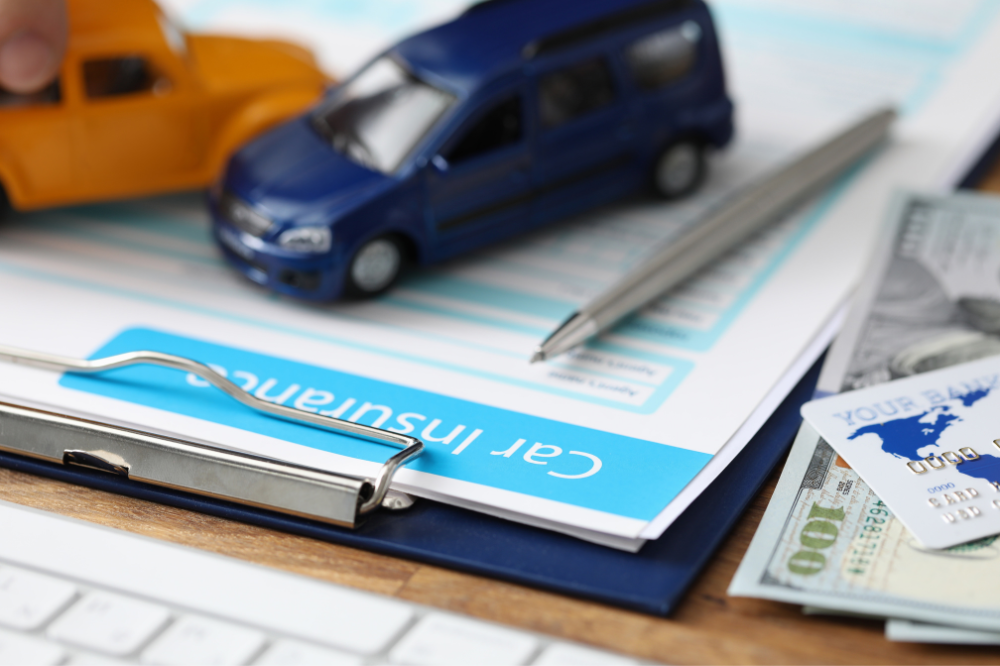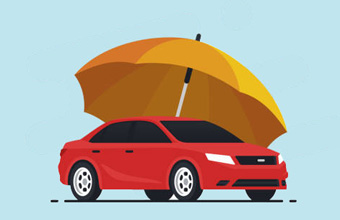What is full coverage car insurance?
Full-coverage insurance is an insurance policy that covers damages to your car, regardless of who is at fault. This type of insurance can help protect you from expensive repairs or replacements if your car is totaled in an accident. It can also provide peace of mind in case you are involved in a hit-and-run or if your car is damaged by vandalism or weather events. full-coverage insurance typically includes collision and comprehensive coverage, as well as personal injury protection and uninsured/underinsured motorist coverage.
While full coverage car insurance is not required by law in most states, it may be required by your lender if you finance or lease your vehicle. Whether or not you need full coverage insurance depends on several factors, including the value of your car and your personal driving history. Talk to your insurance agent to determine if full coverage car insurance is right for you.
What does full coverage auto insurance cover?

Full coverage car insurance is a type of insurance that protects your vehicle in the event of an accident, theft, or vandalism. It typically covers the cost of repairs or replacement up to the full value of your vehicle. Full coverage insurance may also include liability protection if you are found responsible for damages or injuries caused by an accident. full coverage insurance is not required in all states, but it is recommended to protect your investment. When choosing a full coverage insurance policy, be sure to consider the deductibles, limits, and coverage options that are best for you and your vehicle.
Liability insurance, collision insurance, and comprehensive insurance are the three distinct parts of auto insurance. Here is an overview of how each form of coverage functions.
Liability coverage
There are two types of liability car insurance:
- Bodily injury
- Property damage
Bodily injury liability coverage
Bodily injury liability coverage is one of the most important types of car insurance coverage. It helps to protect you financially if you are responsible for injuring someone else in a car accident. If you do not have this type of coverage, you could be sued for damages and be required to pay out a large sum of money. This coverage can help to protect you from financial ruin. Bodily injury coverage pays for the medical expenses of the people who were injured in the accident.
Property damage liability coverage
Property damage liability coverage covers the cost of repairing or replacing property that is damaged in an accident for which you are at fault. This can include damage to other vehicles, buildings, signs, and even utility poles. If you do not have this coverage, you will be responsible for paying for any damages out of your pocket.
Property damage coverage pays for the damage to the other driver’s vehicle. You may also want to consider buying uninsured motorist coverage, which will pay for your medical expenses if you are hit by a driver who does not have insurance.
The cost of liability car insurance varies depending on the insurer and the state in which you live. Generally, liability coverage is the cheapest type of car insurance. However, if you have a poor driving record or are considered a high-risk driver, your rates may be higher. Liability coverage is typically required by law in most states.
Collision coverage
Collision coverage is one of the most important types of car insurance coverage. It helps pay to repair or replace your car if it’s damaged in an accident with another vehicle or object, such as a fence or a tree. If you have collision coverage, you’ll need to pay a deductible (the amount you pay out-of-pocket) before your insurance company will pay for the repairs.
Collision coverage is important because it helps protect you financially if you’re involved in an accident. Even if you have a good driving record, accidents can happen. If you don’t have collision coverage and you’re at fault for an accident, you may have to pay for all the damage to your car out of your pocket. If the other driver is at fault and doesn’t have insurance, you may have to pay for the damage to your car out of your pocket as well. Collision insurance can help protect you from having to pay for these unexpected expenses.
Comprehensive coverage
Comprehensive coverage is one of the most important types of car insurance you can have. It covers a wide range of damages that can be caused to your car and can even provide coverage if your car is stolen. In most cases, comprehensive coverage will cover damages caused by weather, fire, theft, and vandalism. It’s important to remember that comprehensive coverage is not always required by law, but it’s a good idea to have it if you can afford it. If you have a loan on your car, your lender may require you to have comprehensive coverage. If you’re not sure whether or not you need comprehensive coverage, talk to your insurance agent. They can help you decide if it’s right for you.
Medical payments coverage
Medical payments coverage is a type of car insurance coverage that can help pay for your medical expenses if you’re injured in an accident. It can also help cover the medical expenses of your passengers if they’re injured in an accident.
This type of coverage is not required in all states, but it can be a good idea to have if you live in an area with a high number of accidents. It can also help give you peace of mind knowing that you and your passengers are covered in the event of an accident.
There are a few things to keep in mind when it comes to medical payment coverage. First, this type of coverage is not going to cover all of your medical expenses. It’s only going to cover a portion of them.
Second, this type of coverage is not going to cover any property damage that you cause in an accident. This means that if you’re at fault for an accident, your medical payments coverage is not going to cover the damage to the other driver’s car.
Third, this type of coverage is not going to cover any expenses that you incur after the accident. This includes things like lost wages, rehabilitation costs, and even funeral expenses.
Uninsured motorist coverage
Uninsured motorist coverage is a type of insurance that helps to protect you if you are involved in an accident with a driver who does not have any insurance. This type of coverage can help to pay for your medical expenses, as well as damage to your vehicle. It is important to know that this type of coverage is not required in all states, so it is important to check with your insurance company to see if it is something that you need. If you do not have this type of coverage, you may want to consider adding it to your policy to help protect yourself in the event of an accident with an uninsured driver.
Who needs full coverage auto insurance?
Full coverage insurance is not required by law, but it is often recommended by insurance companies. This type of insurance protects against damage to your vehicle, as well as liability coverage if you are involved in an accident. Auto insurance can be a good idea if you have a newer car or a car with a high value, as it will help to protect your investment. In addition, auto insurance can give you peace of mind on the road knowing that you are covered in case of an accident.
How much does auto insurance cost?

Just as there is no such thing as a one-size-fits-all car, there is no such thing as a one-size-fits-all insurance policy. The amount you’ll pay for full coverage insurance depends on a variety of factors, including the insurance company you choose, your driving record, and the type of car you drive. That said, full coverage typically costs more than the minimum required by law. How much more? That depends on your state, but it can be hundreds of dollars per year. If you’re looking for full coverage, be prepared to pay a bit more than you would for basic coverage.
Types of full coverage auto insurance
There are four types of full coverage insurance:
- Liability insurance
- Comprehensive insurance
- Collision insurance
- Uninsured/Underinsured motorist coverage
Liability insurance
It is the most basic type of full car insurance. It covers damages to other people and property if you are at fault in an accident.
Comprehensive insurance
It covers damages to your car from events that are not accidents, such as theft, weather damage, or vandalism.
Collision insurance
It covers damages to your car from accidents, regardless of who is at fault.
Uninsured/underinsured motorist
This insurance covers damages to you and your car if you are in an accident with a driver who does not have insurance or does not have enough insurance to cover the damages.
Benefits of full coverage car insurance

There are many benefits to carrying full coverage car insurance. The most obvious benefit is that it will financially protect you in the event of an accident. If you are at fault in an accident, your liability insurance will cover the costs of any property damage or medical expenses incurred by the other driver. If you are not at fault, your collision and comprehensive coverage will pay for the repairs to your vehicle.
Another benefit of having full coverage insurance is that it can help you to avoid out-of-pocket expenses in the event of a covered accident. For example, if you have a $500 deductible and you are involved in an accident that causes $2,000 worth of damage to your vehicle, you would be responsible for paying the first $500 of those repairs. But, if you have full coverage, your insurance company would pay the remaining $1,500. Here are some of the benefits of having an auto insurance policy:
1. Helps pay for major repairs or replacement costs after an accident
2. Can help you avoid financial hardship if your car is totaled in an accident
3. Gives you peace of mind by protecting from most potential risks
4. Is required by law in many states
5. It May help you get better rates on your car insurance if you have a clean driving record
6. Can help you budget for unexpected expenses by fixing your monthly payments
7. Provides coverage for most types of damage to your vehicle, including theft, vandalism, and weather-related damage
8. May cover the cost of a rental car while your vehicle is being repaired after an accident
9. May cover the cost of towing and labor if your vehicle breaks down
10. Gives you the flexibility to choose the coverage that best meets your needs
How can I get full coverage insurance for my car?
There is no definitive answer to this question as there are many factors that can affect your auto insurance rates and coverage. However, there are a few things you can do to help ensure you get the most comprehensive coverage possible:
1. Shop around and compare rates from different insurers
2. Ask about discounts and consider bundling your auto insurance with other types of insurance such as homeowners or renters insurance
3. Make sure you understand the coverages and limits of your policy so that you know what is and is not covered
4. Consider increasing your deductible if you have a good driving record and are comfortable with paying more out-of-pocket in the event of an accident
Tips for shopping for full coverage auto insurance

Full auto insurance is one of the most important types of insurance you can buy for your car. It protects you financially in the event of an accident, and it also helps to keep your car in good repair. Here are some tips for shopping for auto insurance:
1. Make sure you are getting the right amount of coverage. Too little coverage could leave you financially vulnerable in the event of an accident, while too much coverage could mean you are paying more than you need to.
2. Shop around and compare rates from different insurers. You may be able to get a lower rate by switching to another company.
3. Consider raising your deductible. A higher deductible means you will have to pay more out of pocket if you have an accident, but it can also lead to lower premiums.
4. Make sure you are getting all the discounts you are eligible for. Many insurers offer discounts for things like having a clean driving record or taking defensive driving courses.
5. Review your policy periodically and make sure it still meets your needs. As your life changes, so do your insurance needs. Make sure you are not paying for more coverage than you need.
These are just a few tips for shopping for full coverage insurance. For more information, contact your local insurance agent or company.
FAQs
1. What is full coverage car insurance?
Full coverage car insurance is a type of insurance that covers both liability and collision damages. This type of insurance is often required by lenders if you finance or lease a car.
2. Do I need full coverage car insurance?
No, you are not required to have full coverage insurance, but it is recommended. Full car insurance will protect you financially if your car is damaged or stolen.
3. How much does full coverage car insurance cost?
There is no definitive answer to this question since there are a variety of factors that can affect the cost of full coverage insurance, including the type of car you drive, your driving record, the amount of coverage you need, and the insurance company you use. However, the average cost of full coverage insurance is $1,448 per year, according to data from the National Association of Insurance Commissioners.
4. What does full coverage car insurance cover?
Full coverage car insurance covers the damage to your car in the event of an accident, as well as any liability claims against you. It also covers any damage caused by weather events, theft, or vandalism. If you have full coverage insurance, you will be protected against financial losses if your car is damaged or stolen.
5. Does full coverage car insurance cover accidents?
Full coverage car insurance typically covers accidents, but there may be some circumstances where it would not. For example, if you are at fault for an accident, your insurance company may not cover the damages. If you have an accident while driving a rental car, your insurance company may not cover the damages. It is always best to check with your insurance company to see what is and is not covered.
6. Does full coverage car insurance cover repairs?
No, full coverage car insurance does not cover repairs. However, it may cover the cost of a rental car while your car is being repaired.
7. Does full coverage car insurance covers theft?
Yes, full coverage car insurance will cover theft. However, there may be a deductible that you will have to pay before your insurance kicks in. Also, if your car is stolen, you will likely have to pay a higher premium when you go to renew your policy.
8. What should I do if I can’t afford full coverage car insurance?
There are a few options available to those who cannot afford full coverage car insurance. The first is to purchase a liability-only policy, which will cover damages to another person or their property in the event of an accident but will not cover any damage to your vehicle. Another option is to purchase a high deductible policy, which will lower your monthly payments but will require you to pay more out of pocket in the event of an accident.
9. Is full coverage insurance worth it?
There is no definitive answer to this question, as the value of full auto insurance depends on several factors, including the driver’s circumstances. However, full auto insurance offers several advantages, including financial protection in the event of an accident, as well as peace of mind. Ultimately, whether or not full auto insurance is worth the cost is a decision that each driver must make for themselves.
10. What Is comprehensive and collision coverage?
Comprehensive and collision coverage are two types of car insurance that are optional in most states. If you do choose to purchase these types of coverage, they will pay for damages to your car if you are involved in an accident, or if your car is damaged in some other way (such as by fire or theft). Comprehensive coverage will pay for damages to your car that are not the result of an accident, such as those caused by weather or vandalism. Collision coverage will pay for damages to your car that are the result of an accident.
Bottom Line
Now that you know what full coverage car insurance is, we hope you can see the importance of having it. Full auto insurance provides drivers with a host of benefits, including protection from lawsuits, medical expenses, and damage to their vehicles. It’s important to remember that not all full coverage policies are created equal; be sure to read the fine print and ask questions so you understand exactly what your policy covers. Read our other blog posts to know about different insurance policies.











